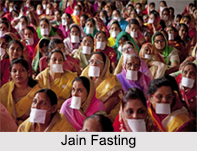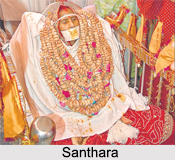 Fasting is a common ritual among the Jains. Fasting is observed by the Jains at special times, during festivals, and also on holy days. According to Jains, fasting purifies the body and the mind. Fasting is a form of Tapa for self-purification. It is practiced to shed off already accumulated karma (Nirjara). It elevates the person physically, morally, mentally and spiritually.
Fasting is a common ritual among the Jains. Fasting is observed by the Jains at special times, during festivals, and also on holy days. According to Jains, fasting purifies the body and the mind. Fasting is a form of Tapa for self-purification. It is practiced to shed off already accumulated karma (Nirjara). It elevates the person physically, morally, mentally and spiritually.
The fasting ritual is observed during the time of monsoon. However, a Jain may fast at any time, especially if she feels some mistake has been committed. There are many variations in fasting that encourage Jains to maintain self-discipline. It is also believed that it is not sufficient to stop eating when fasting; but also the craving for eating needs to be stopped. Monks and nuns fast as penance and to control cravings.
Types of Jain Fasting
Jains follow different types of fasting which are stated below:
1. Santhara or Total Fasting: Here, one gives up food and water entirely. This leads to death and is undertaken by someone who has finished all his or her duties and wishes to leave this world serenely.
2. Partial Fasting: Here, one eats less than he desires. It is done simply to avoid hunger.
3. Vruti Sankshep: Here, one limits the number of items eaten.
4. Rasa Parityag: Here, one gives up his favourite foods.
5. Great Fasts: Some monks fast for months at a time. It was done by Lord Mahavira, who fasted for over 6 months.
6. Varsitap: Here one eats on alternate days and maintains Upvas the rest of the days. The fasting should also be observed with other rules like not eating in the evening after sunset, not eating root vegetables like potatoes, onions, ginger and various other rules.
7. Chauvihar Upvas: Here, one gives up food and water for the whole day.
8. Upvas: Here, one gives up only food for the whole day.
9. Digambar Upvas: Here, one drinks water only once a day, before sunset.
10. Shvetambar Upvas: Here, one may drink boiled and cooled water after Porsi, but before sunset.
11. Tivihar Upvas: Here, one may drink boiled water between sunrise and sunset.
12. Ekasanu: Here, one may eat one meal a day at one sitting and drink boiled water as desired between sunrise and sunset.
13. Beasanu: Here, one may eat two meals a day in two sittings and drink boiled water anytime between sunrise and sunset.
 14. Ayambil: Here, one eats food once in one sitting. The food contains only cereals and pulses not sprouted and it is spice free and boiled or cooked. It does not contain milk, curd, ghee, oil, oil seeds, or green/ raw vegetables, fruits and sugar and its products.
14. Ayambil: Here, one eats food once in one sitting. The food contains only cereals and pulses not sprouted and it is spice free and boiled or cooked. It does not contain milk, curd, ghee, oil, oil seeds, or green/ raw vegetables, fruits and sugar and its products.
15. Bela: Here, one gives up both food and water or only food continuously for 2 days.
16. Tela: Here, one gives up food and water or only food continuously for 3 days.
17. Aththai: Here, one gives up food and water or only food continuously for 8 days.
18. Masaksaman: Here, one gives up food and water or only food continuously for a whole month.
19. Navkarsi: Here, food and water is consumed minimum 48 minutes after sunrise. Devout Jains brush their teeth and rinse their mouths only after sunrise.
20. Porsi: Here, one may take food and water 3 hours after sunrise.
21. Sadh Porsi: Here, one may take food and water 4 hours and 30 minutes after sunrise.
22. Purimuddh: Here, one may take food and water 6 hours after sunrise.
23. Avadhdh: Here, one take food and water 8 hours after sunrise.
24. Tivihar: Here, one must not take food or juice shall be taken after sunset but one may drink water. Many Jains practise this daily.
The Swetambara fast generally with boiled water while the Digambara often fast without water. In Digambara tradition, fast also must be done at some periods during the year (last 8 days of Kartika, Phalgun, Asadha). According to Swetambara tradition, fasts can be done on the 5th, 8th, 14th or 15th of days of Indian months in both dark and bright fortnight; at holy days celebrating birth and salvation of Tirthankara.
Fast is a vow denoting abstinence from food and drink, in whole or in part, for a fixed period of time and to devote that time to religious activities, study of scriptures, observing silence and cultivating equanimity.









